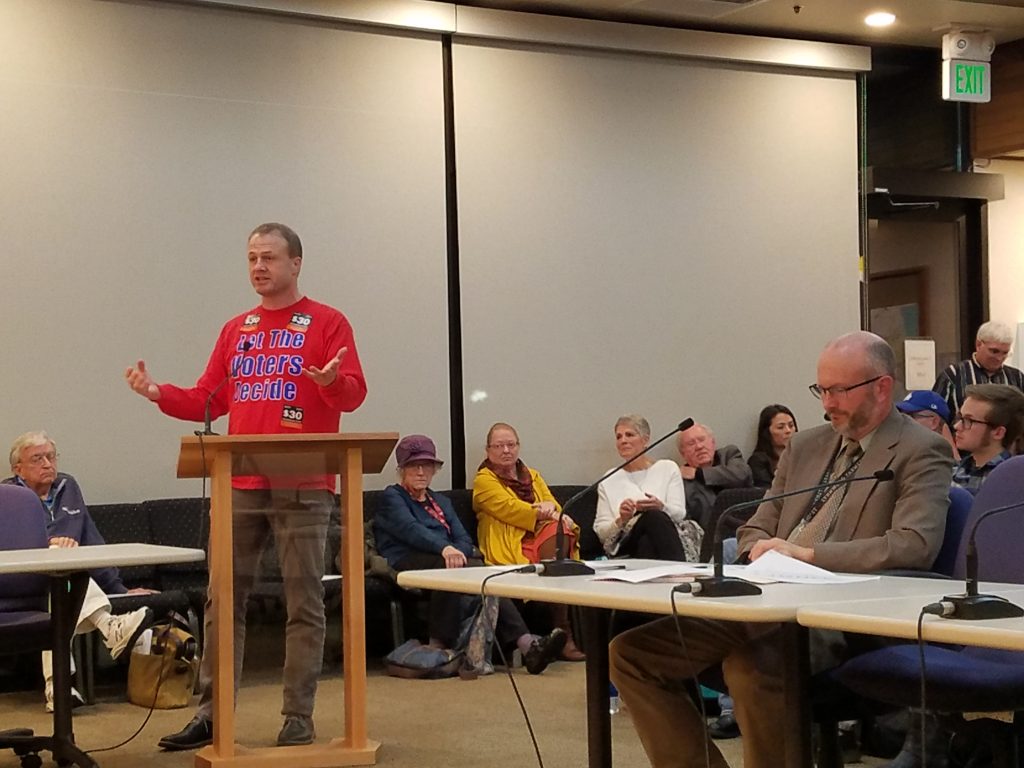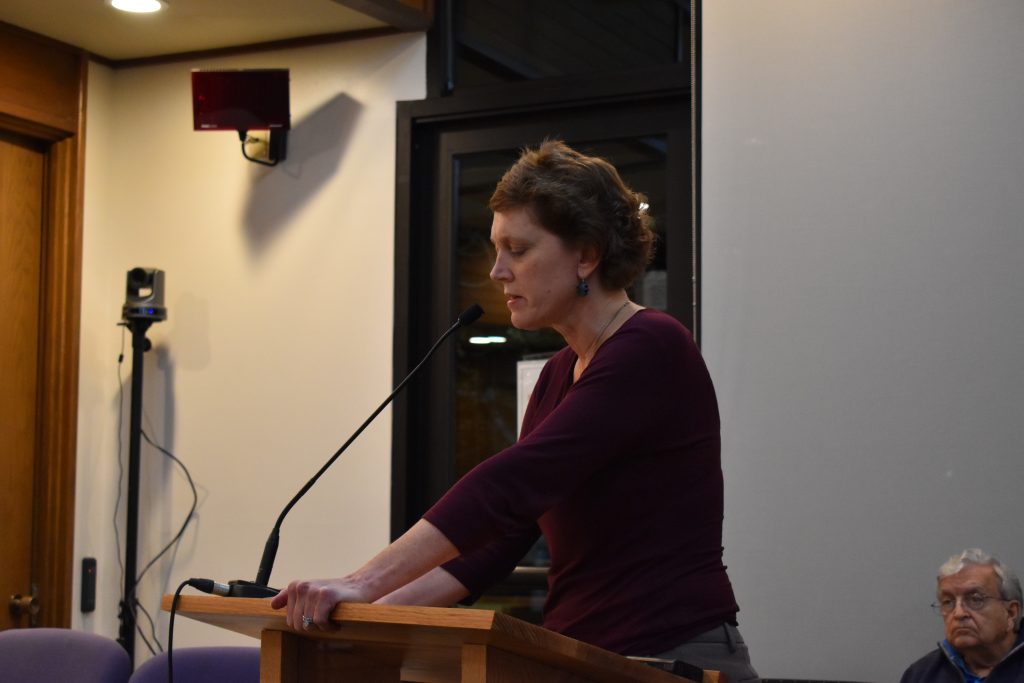By LUKE PUTVIN | Updated October 17, 2019
At the October 14 Business Meeting, Lynnwood City Council passed a resolution opposing Washington State Initiative 976 as well as tabling the formation of an Ad Hoc Task Group, the purpose of which would be to draft a proposed displaced low-income tenant ordinance. The initiative would limit annual license fees for vehicles under 10,000 pounds to $30, base vehicle taxes on Kelley Blue Book price and would repeal authorization for certain regional transit authorities, such as Sound Transit, to impose motor vehicle taxes.
The public discussion around this resolution was extensive. Some approved of the resolution but others, while not necessarily approving of the initiative, didn’t approve of the city council taking such a stance on a state initiative.
Tim Eyman, sponsor of the initiative and similar past initiatives, was present during public comment. “It is blatantly illegal for the government to use tax dollars to oppose a citizen initiative,” Eyman said. “But what really infuriates people is the government telling people how they should vote… You’re the ones who are getting the dishonest taxes, so of course you don’t care if you’re honest or not.”

Eyman was referring to RCW 42.17A.555 which prohibits an elected official using facilities of a public office for the purpose of promotion or opposition to a ballot proposition. However, this does not apply to the following: “Action taken at an open public meeting by members of an elected legislative body or by an elected board, council, or commission… so long as (a) any required notice of the meeting includes the title and number of the ballot proposition, and (b) members of the legislative body, members of the board, council, or commission of the special purpose district, or members of the public are afforded an approximately equal opportunity for the expression of an opposing view.”
Even though it is not illegal for the city council to pass a resolution like this, it does not mean there were not members of the public that opposed the resolution.
“This could lead down a long road of problems for the city council if you take up this resolution,” said Jim Smith, former Lynnwood City Councilmember and current candidate. “You should be looking at what the citizens decide on… let them decide, but don’t talk about it here and tell them how they should be voting.”
There were also those that supported the resolution, like Lynnwood resident Teo Popescu. “I am very excited to see you taking up a “No on I-976” resolution,” she said. “I understand that people are struggling and car tabs are a part of that, but using car tabs as a way to decimate our future city is very short-sighted and is definitely something that car companies and other large businesses and industries would like us to be focused on instead of the fact that keeping us in our cars is good for their bottom line.”
Earlier during councilmember comments on the resolution, Council President Benjamin Goodwin shared some of these concerns. “To me, this is not about the initiative itself; to me, it is more about the initiative process… the initiative process is a process of the people… I will not support this resolution.”
“I’m not a fan of Mr. Eyman,” started Councilmember George Hurst, “but I have to agree with him… I have no problem on passing a resolution that is purely informational, but if we express it should be ‘no’ on a citizen initiative, that’s where I have a problem. So I can’t support the resolution as it is now written.”
Councilmember Ruth Ross was in favor of the resolution. “People often ask us ‘what do you think on something that is happening locally, county-wide, statewide. Well here’s my opinion: Don’t support this. And that’s what we’re saying, and that’s all we’re saying… we’re asking you not to support it; we’re not telling you how to vote. We’re just telling you what we think.”
Also in favor of the resolution was Councilmember Ian Cotton. “One of the biggest things people will bend your ear about is traffic… and one of the primary mechanisms we have in place to mitigate traffic is improvements to, expansions of and well-maintained transportation systems, which are our roads… We’re here as representatives of you… most people talk to me about traffic,” Cotton said. “And so, in my mind, especially because the voters of Lynnwood two years ago supported a ballot measure to fund roads through sales tax… the voters of Lynnwood supported that.”
The resolution passed 5-2 with Goodwin and Hurst as the dissenting votes.
That evening, Hurst also proposed the creation of an ad hoc Housing Task Group to draft a low-income tenant ordinance. Ad hoc is defined by the Merriam-Webster as “concerned with a particular end or purpose,” so the task group would not be permanent and would only exist up to the point it is necessary.
The proposal was made to assist those living in Whispering Pines; the apartment complex is being demolished, and residents need to be out by September of 2021.
Hurst’s proposal contained including specific individuals including himself, Human Services Commissioner Pam Hurst, housing advocate Kim Toskey and another councilmember among others. Cotton seconded the motion.
Councilmember Ross agreed with making an ad hoc task force, but she was opposed to naming specific people to be on the force. She offered an amendment to the proposal to remove the named individuals, and Councilmember Shirley Sutton seconded the motion.
Hurst then offered an amendment to that amendment that the task force be subject to the Open Public Meeting Act and that public comment be allowed at any meeting of the group. Cotton seconded the amendment.
“I have concerns about a committee such as this,” Council Vice President Frizzell said. “I think forming an ad hoc committee goes against [the plan of creating a housing policy]… We’ve already had Councilmember Hurst and Pam Hurst going out ahead of us and talking up all these issues when we’re left in the dark… This is a council-centric issue.”
“I do share some of the same concerns,” Goodwin said. “When there is a topic of such importance, it is vastly important that there is collaboration within the council itself… that collaboration was not present.”
“I do not believe there is a gate around Whispering Pines,” responded Hurst. “Any councilmember can go there and talk with residents. I brought this issue up to the council [in November of 2018] about this ordinance.” Hurst continued to mention how the issue was then taken to the Human Services Commission where he said the city staff introduced it by saying, “We’ve been asked by the council to discuss a displaced low-income tenant ordinance, but the majority of the council is not interested.” He asked how the committee would be inspired to continue when it was introduced in such a way.
“As we know,” Councilmember Shannon Sessions began, “this isn’t just a Lynnwood issue; this is regional… this is a big issue. Which is why it is inappropriate and irresponsible to legislate at the dais.”
“We are the legislative branch, which our job is to largely, normally, initiate legislation, which is changing laws,” said Cotton. “We’re not legislating from the dais; we’re asking for a committee to be made. Secondly, while there are regional issues that affect the city, we’re not talking about the regional issue of homelessness, we are talking about our neighbors who have come here tonight and said: ‘help.’”
“I’m a little disappointed,” Sutton said. “We are here to help, not to hinder, not to create barriers, and that’s what I see happening. And this is not the first time that people have come to us to ask for help… These folks are our citizens; we need to be paying attention.”
Several residents from Whispering Pines spoke earlier during the public comments portion.
“I need you to know the impact that [the shutting down of Whispering Pines] is going to have,” said resident Kelly Brookbank. “There’s no place for us to go. Rental rules, you need to make four times your monthly rent to live there.”
“After finding out at the beginning of this year that I have a very rare form of cancer,” said another Whispering Pines resident, Hillary Lowman. “Things have been difficult trying to save money whilst I’m not working and trying to fight cancer… Cancer is not cheap.”
After the council voted and passed the amendments to take out specific names in the proposal and make it subject to the Public Meetings Act, Frizzell moved to table the discussion to a work session. Goodwin seconded, and it passed 4-3 with Hurst, Cotton and Sutton as the dissenting voices.
Former Lynnwood Councilmember and county tourism chair Kerri
Lonergan-Dreke was present at the meeting.

“I think there were a couple of councilmembers who don’t support this, so they were hiding behind this lack of process by saying they need to be informed ahead of time about what is going to be in new business,” Lonergan-Dreke said. “The four years I served, there were number of times councilmembers will bring up something new under new business. This is the purpose of new business.”
Darlarae Osborn, a resident of Whispering Pines, made some comments after the meeting. “Lynnwood could be an example for other cities, and I just feel like [Frizzell] and Shannon Sessions and Ruth Ross are simply not on board, and it makes me feel like they don’t care.”
“I’m just frustrated by the lack of common sense and progress,” Maria Roth, another resident, said. “It seems to me that there are personalities and not sincere Lynnwood business going on, and I hope those personalities will be voted out next election, because they aren’t doing any good for our city.”
City Council Candidate Nick Coelho, opponent to Hurst for the Position 6 seat, commented, “This was political theater. George is not working with the council. I suspect this was politically motivated to catch everyone off guard. I feel sorry for those at Whispering Pines dealing with this; it is a shame they are being used as fodder for a political campaign.”
When asked how Hurst felt that the proposal was tabled to a work session, he replied, “I think it’s typical council delay tactic on issues that are important to the residents, and it’s a sad commentary.” Hurst also said, “I’m not doing this for my campaign, I’m doing this to help give the residents hope.”
After the meeting, Council President Goodwin stressed that his vote was not a reflection of whether he supported or opposed Hurst’s idea of the ad hoc committee itself, but the way that Hurst proposed it.
“It’s important that any information that comes to the council comes in collaboration,” Goodwin said. “The collaboration wasn’t there… It’s a concern not being able to talk about or discuss the issue before we actually vote on it or assign an ad hoc committee. If a majority of the council decides that’s not an ordinance we need to do, then what we’re doing is just wasting time. I would rather be more efficient, and have the council discuss it first and say ‘yes, this looks like something we can do’ or ‘no, there’s something else that the council needs to do.’” The council will continue its discussion on the ad hoc committee at the work session on Monday, October 21.
Author: Mario Lotmore












